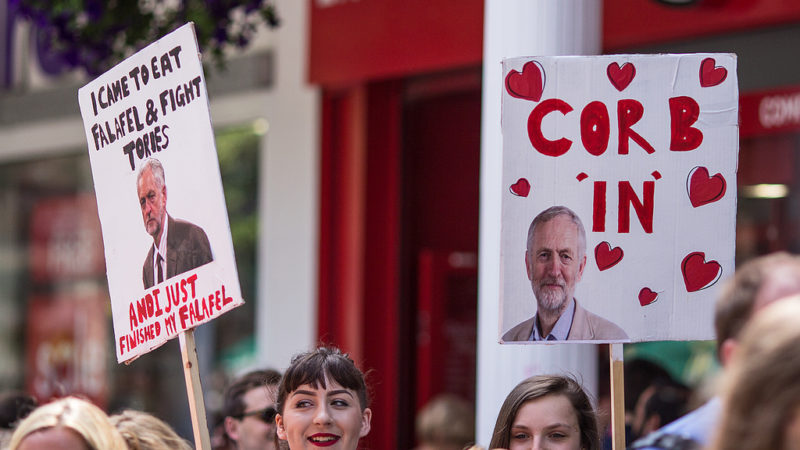Tackling nequality, nationaliation and raising the minimum wage are popular left-wing policies.

For the likes of us at Left Foot Forward, ‘left wing’ and ‘right wing’ are terms we use so much that we can lose sight of what they mean to the general public.
So it’s useful for us that YouGov has done some new polling on what policies are most recognisable to the public as ‘left-wing’.
When looking at these, it’s important to note that these policies aren’t necessarily seen as ‘the most left-wing’.
They’re just the recognisable to the most people as ‘left-wing’ – whether moderately or radically. So what are they?
One thing this shows is that about 30% of the public don’t know what left-wing and right-wing mean – but it also shows about half the country have a pretty accurate view of what a left-wing policy is.
So when you describe yourself as a left-winger, these policies are what most people think you believe in.
Fortunately, these policies are mostly pretty popular – with some exceptions.
Nationalisation of utilities and railways is probably the most popular – with even Tory voters supporting it. Similarly, even Tory voters want to raise the minimum wage.
Measures to redistribute income are also very popular, at least in the abstract – although specific measures to tax the wealthy are less so.
The most controversial left-wing views are probably opposing the monarchy and opposing the UK having nuclear weapons.
Its no coincidence that these are the only two of the ten left-wing views which the Labour Party didn’t have in its last manifesto in some form.
Seven in ten Brits continue to support Britain having a monarchy with just two in ten opposed.
With nuclear weapons, the picture is a bit more mixed. Only about a quarter of the population want disarmament in any circumstances. Support for disarmament rises if framed as part of a global disarmament effort.
So what policies do the public think are right-wing?
Of these, one popular view is being “tough” on crime. One unpopular view is encouraging private-sector involvement in the NHS.
This is reflected in the Tory’s current election strategy – talk tough on crime to play to a right-wing strong point and pledge money for the NHS to neutralise a right-wing weak point.
The public’s views aren’t fixed of course – they can and do change in response to argument and events.
But in the short term, if Labour wants to win the next election, it needs to try and get the conversation onto its popular policies: nationalisation, raising the minimum wage and tackling inequality.
It also needs to try and stay away from the right’s fertile ground – like immigration, crime and nuclear weapons.
With the government having a natural dominance over the media agenda though, this will be easier said than done.




7 Responses to “What are left-wing policies and are they popular?”
Tom Sacold
The terms ‘left wing’ and ‘right wing’ are quite meaningless.
The real point of difference is economics and the overriding role of markets in maintaining the capitalist hegemony over the working class.
For a socialist future, markets must become a thing of the past.
nshgp
You missed off wealth inequality
You missed off £450,000 of debt per tax payer.
You missed off lack of investment
You missed off poverty
You miss ed off mass migration of the poor.
Oldlefty
I agree that we should build on our strong points like nationalisation and protecting the NHS. But, as you fear, we will not be allowed to ignore Right Wing talking points like immigration or crime. But we can always REFRAME these “weak” issues for us. The lack of Police on the streets, the apparent growth of violent crime during the Tory tenure can be emphasised. We can thank Tony Blair and Gordon Brown for the increase in Police numbers that the Tories have failed to maintain(I never thought I would be thinking something like that!)
And we can repeat the truth that we NEED immigrants to keep the country going whether working on farms , or in the NHS or Care Services, or hotels/restaurants etc. Unless Brexit-voters can take a little spare time to have some more children, the UK is going to be sadly short of labour for many years.
Perhaps this current political crisis caused by the Brexit fantasy gives us an opportunity to actually debate these issues to our advantage rather than hoping they will go away if we don’t mention them. They will only fester and grow more toxic if we do. How else did the Leave-vote appear so strongly?
Julia Gibb
The major problem holding back “left wing politics” is tribal Party Politics. The two party system is gone but the FPTP system remains. We have people who vote Green, SNP, PC etc who are sneered at by Labour Party activists. Only Labour has a pure and glorious socialist values.
I look at our modern Labour Party and I see a set of politicians who range from strong left wing socialists to openly clear cut Red Tories. They are all trying to squeeze under the one banner to achieve a win under FPTP.
We will carry on with alternative turns at the trough. Labour for a term or two followed by the Tories. Both have become hand puppets of the elite.
We have a country with Royalty born to rule over you. A nation fixated with their military might ( WMD, Astute Class subs, Aircraft Carriers). A nation that has the sales of military hardware as a positive. Governments that still intervene in the politics of other countries. The worst pensions in Europe. Foodbank usage rising. An unelected House of Lords etc etc
All of the above supported by Tory AND Labour Governments decade after decade.
Julia Gibb
Latest report on UK finances out today. Apparently the 8 percent of the population living in Scotland ran up 60 percent of the U.K. Debt.
Does anyone seriously belief that nonsense???